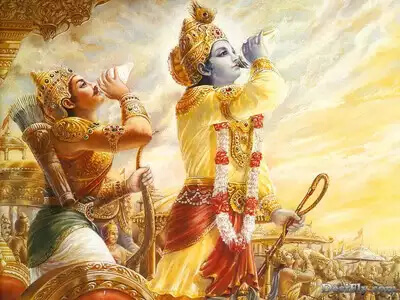Gita Jayanti marks the sacred day when the Bhagavad Gita, one of the most revered scriptures of Hindu philosophy, was delivered by Lord Krishna to Arjuna on the battlefield of Kurukshetra. Celebrated annually on the 11th day of the Shukla Paksha (waxing moon phase) in the Hindu month of Margashirsha (typically falling in November or December), this occasion holds profound spiritual and philosophical significance.

The Essence of the Gita
The Bhagavad Gita is a 700-verse dialogue that forms part of the Mahabharata. It addresses timeless dilemmas about duty, righteousness, and the path to self-realization. Arjuna, overcome with doubt and moral confusion about fighting in the war, seeks guidance from Krishna, who enlightens him with wisdom that transcends the battlefield.
The Gita explores key spiritual themes such as:
- Dharma (duty and righteousness).
- Yoga as a path to union with the divine.
- The balance of karma (action), bhakti (devotion), and jnana (knowledge).
- The imperishable nature of the soul.
Celebrations and Rituals
Devotees observe Gita Jayanti with reverence and devotion through the following practices:
- Recitation of the Gita: Chanting the scripture's verses is a central activity, often accompanied by explanations and discussions on its meaning.
- Bhajans and Kirtans: Spiritual songs glorifying Lord Krishna and the teachings of the Gita fill the atmosphere with divine energy.
- Seminars and Discourses: Scholars and spiritual leaders conduct sessions to delve deeper into the Gita’s philosophy and its relevance in modern life.
- Charitable Acts: Many devotees engage in acts of kindness, embodying the Gita’s principles of selfless service.
The Timeless Relevance of the Gita
The Bhagavad Gita transcends religious boundaries, offering guidance for anyone seeking clarity in life’s challenges. Its lessons on managing desires, balancing emotions, and fulfilling one’s duties with detachment remain as relevant today as they were thousands of years ago.
For practitioners of Kundalini Yoga, Gita Jayanti serves as a reminder to balance the mind, body, and soul. The text aligns beautifully with the yogic principle of inner awareness and connection with the divine.
How You Can Celebrate
- Dedicate time to read or listen to the Gita’s verses and reflect on its teachings.
- Practice selfless acts of kindness, aligning with the principle of karma yoga.
- Engage in meditation or yoga to cultivate inner peace and harmony.
- Organize or participate in discussions about applying the Gita’s lessons in contemporary contexts.
Conclusion
Gita Jayanti is more than a celebration—it is an invitation to explore the profound wisdom of the Gita and integrate its teachings into everyday life. Whether you are seeking spiritual growth, ethical clarity, or emotional resilience, the Bhagavad Gita offers a roadmap to living with purpose and grace. On this sacred day, let us honor this timeless scripture and the universal truths it reveals.


0 Comments